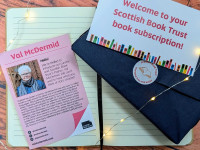
Fun and useful Christmas gifts for writers
scottishbooktrust.com – Friday November 15, 2024

A few fun ideas for treating the writer in your life this festive season
Picking out Christmas gifts for writers can be tricky. After all, it’s not possible to pop a literary agent or massive book deal under the tree. Luckily, there are lots of other brilliant ideas for making the writer in your life feel special over the holidays. Here are a few of our favourites.
Books about writing
Even the most experienced writers sometimes need a little boost and that’s when books about harnessing creativity or examining the writing process are perfect. We’ve gathered together a few great suggestions in our writing about writing book list. I can also guarantee that if you walk into your local bookshop and ask what the staff recommend, they’ll be able to pick out something inspiring for you.

'Three Women' Writer Lisa Taddeo Offers 3 Writing Insights Every Aspiring TV Writer Should Know
screencraft.org – Thursday November 14, 2024

In ScreenCraft’s new interview with author and showrunner Lisa Taddeo, we dive into the art of adaptation and screenwriting. The writer recently brought her acclaimed book Three Women to the screen, and she has quite a few things to teach us about her process.
The Starz series features Shailene Woodley, Betty Gilpin, DeWanda Wise, and Gabrielle Creevy, and it’s based on Taddeo's bestselling exploration of desire, intimacy, and vulnerability. In the show, an author (Woodley) tells the complex stories of three women as they navigate the highs and lows of love and life.
It’s nonfiction—a true depiction of these women’s relationships and (at times, shocking) sex lives.
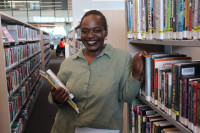
First Person: My journey to writing a children’s book
algonquintimes.com – Sunday November 10, 2024

Over seven days, I put my dream of writing a book for kids into motion. The adventure taught me I can do more than I ever thought I could
“No, Auntie! Don’t go!” Kavaiah’s sweet voice stops me just as I’m about to step out the door. She tugs at my hand, holding tight to a new book I bought her, I Am Born to Be Awesome by Mechal Renee Roe. “Just read the book one more time, Auntie, PLEASE!” she begs, her eyes wide. How can I not be compelled to stay?
I smile, settle back onto the couch, and she jumps into my lap, eagerly flipping the book open to the first page. Kavaiah is full of energy when we read. She acts out each line, her four-year-old voice rising and falling with each word, making faces and gestures, soaking in every picture and phrase like it’s her first time hearing them.
I start, “I love the stars,” and she shouts, “I love racing cars!” Then we both chime in, “I am born to be awesome!” She takes her time turning each page, determined to slow me down if I go too fast. With every line, she finds something that resonates, whether it’s her love for bath time or playing in the park. She’s not just listening; she’s living each rhyme, seeing herself in the words and pictures. Each time we reach “I am born to be awesome,” she beams, and I feel it too. Her high-pitched voice makes my heart melt.
I never imagined that enrolling in Algonquin College’s journalism program would lead me to begin to write a children’s book. When the opportunity to write a personal narrative arose, I thought, why not take it further? Why not challenge myself to write a children’s book in seven days? I naively thought it wouldn’t be too hard, after all, it’s a children’s book. How complicated could it be?
Well, as it turns out, it was more challenging than I anticipated.

On the benefits of working slowly
thecreativeindependent.com – Thursday November 7, 2024

Caoilinn Hughes discusses writing as a process of discovery, being a monotasker, and the importance of wisdom in producing good work.
You’ve had a very international life. You grew up in Ireland, where you studied literature and drama. You subsequently lived in New Zealand, where you earned a PhD in English literature, and in the Netherlands, among other countries. Could you describe your path to becoming a writer?
I was always writing, even when I was a kid, aged nine, ten. As a teenager, I wrote a lot of poems, as that’s really what I read. I read poetry and plays, because I was a very slow reader. It felt like a very intimate interaction. There’s all this blank space around the work, and it seemed to invite a direct conversation between the author and the reader. An activity, rather than something that you receive passively.
I went to the North of Ireland to study at Queen’s University Belfast, partly because I didn’t have the grades to go to college in the Republic. And also, a lot of the poets I was reading were from the North, so it felt fated to go there.

Pantser vs. Plotter: Authors Debate the Best Approach to Writing
booktrib.com – Saturday November 2, 2024

In another life, I’m a writer who meticulously plans out the entire trajectory of my book before I even touch my fingers to the keyboard. When I sit down to work, I refer to the chapter outline I created, which maps out every beat of the story.
So straightforward! So elegant!
Unfortunately, that’s not my approach. My muse-dependent technique is what’s known as “pantsing,” or flying by the seat of my pants, and if I could change it I one-hundred percent would. Sometimes, the end of the chapter means the beginning of a crisis while I struggle to figure out what’s supposed to happen next?
The other side of the writing equation, being a “plotter,” is tougher during the initial drafting stages since it requires the writer to conceptualize every twist and turn before starting, but it ensures a more predictable writing process as the narrative unfolds, and easier editing.
I’ve tried outlining, but my biggest issue with it is I feel disconnected from the story if I don’t let it unfold naturally. I’ve found that outlining limits the serendipity I crave when I’m immersing myself in the writing process. I love it when my characters surprise me, which happened quite a bit as I worked on my last novel, Unleashed Holiday.
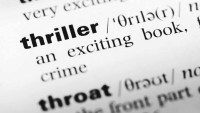
The Heartbeat of Suspense: Mastering Pacing in Thriller Writing
rollingstone.com – Friday November 1, 2024

In the pulsating world of thriller fiction, pacing is the silent conductor, orchestrating a symphony of tension and release that keeps readers perched on the edge of their seats. It’s the art of manipulating the reader’s pulse, accelerating it with bursts of action, then allowing brief moments of respite before plunging back into the maelstrom. This delicate balance is what transforms a good thriller into an unputdownable page-turner.
The Anatomy of a Thriller’s Pace
At its core, effective pacing in thrillers is about managing the ebb and flow of tension. It’s akin to composing a piece of music, where crescendos of intensity are balanced with quieter passages, each enhancing the impact of the other. This rhythmic variation is crucial in maintaining reader interest and engagement throughout the narrative.
Hooking Readers from the Start
Many successful thrillers begin in medias res — in the middle of the action. This technique immediately immerses readers in a high-stakes situation, grabbing their attention and setting the tone for the rest of the novel. The opening pages serve as a promise to the reader, a taste of the thrilling journey that lies ahead.

Inside the writers’ room
artshub.com.au – Friday November 1, 2024

Getting a toe in the door of the writers' room can be challenging, but these successful writers share some tips.
A writers’ room is something like the nerve centre of a scripted drama or comedy, a place where some combination of writers, producers, editors and developers come together to brainstorm the overall arc of a series and flesh out the plot of each episode.
Many playwrights, comedians and filmmakers aspire to break into the world of writers’ room, but they present challenges in adapting to someone else’s voice and working in a newly collaborative way. They can also be mysterious to the uninitiated and are notoriously tricky to break into.
Here ArtsHub talks to four writers who have worked in a range of rooms, and who have taken different paths to these writing gigs, to discover how they found their way in and what they’ve learned.
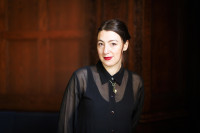
‘Dark things can be quite illuminating’
news.harvard.edu – Friday November 1, 2024

Horror writing instructor defends prestige of ‘genre that bites back’
Self-described “former spooky kid” Katie Kohn teaches the class “Advanced Fiction: Writing Horror” at Harvard Extension School. The Gazette interviewed Kohn, a doctoral candidate in the Art, Film and Visual Studies program, about people’s fascination with scary stories, the difference between bad and good horror, and what the genre can teach us about ourselves.
What makes horror stories different from other stories?
All stories are rooted in conflict; they promise us that things will go wrong. But horror stories do two things that I truly think are unique. For one, horror tends to destabilize the very binaries out of which other stories source their tension. It’s not just about playing good against evil, the familiar against the strange. Horror complicates. For instance, we use the term “uncanny” to describe a breakdown between something we recognize and something we don’t. It’s neither simply familiar nor strange; it’s somehow both. Horror loves to take us to these places where nothing is certain, where it feels like the rug is always about to come out from under us.
That’s the other effect horror stories promise: uncertainty to the very end. Horror asks us to accept the prospect that things might not turn out well. If other stories overcome challenges or resolve tensions, this one might be as raw and as confrontational as life can be, without curation or niceties. For instance, there are points at which we no longer feel safe reading a horror story or watching a horror film, that moment when we want to look over our shoulder or check under the bed. All stories ask that we suspend our disbelief. Horror exploits that basic instinct to give ourselves over to stories. Horror is a genre that bites back.
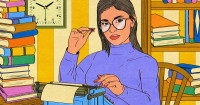
Who’s Really Writing Celebrity Novels?
vulture.com – Friday November 1, 2024

The writers and agents working behind the scenes tell us how it actually works.
Celebrity memoirs are a dime a dozen, but there’s a smaller cohort of stars who have tried to add “novelist” to their résumés. This includes Kylie and Kendall Jenner, who wrote the 2014 YA novel Rebels: City of Indra; Carrie Fisher, author of the deeply autobiographical Postcards From the Edge; and Tyra Banks, whose 569-page Modelland is about a girl named Tookie De La Crème. In early October, Reese Witherspoon announced she was collaborating with the best-selling thriller author Harlan Coben. But what does it mean when a celebrity decides to write fiction?
Here, the writers and agents working behind the scenes on similar books tell us how it actually works.
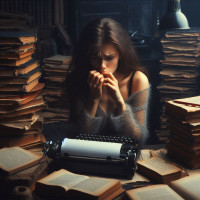
Suspense (A state or condition of mental uncertainty or excitement…)
By G. Miki Hayden
Instructor at Writer's Digest University online and private writing coach
firstwriter.com – Thursday October 31, 2024

Suspense, as a noun, may sound vague, but as an artful expression in film, on stage, or in novels, suspense is a fairly specific ingredient. Suspense can dominate the genre being presented throughout, or suspense can come to the fore for a scene or a moment at the height of the story, and then resolve. Suspense can be sprinkled in like a condiment, or it can relentlessly keep an audience on the edge of their seats for the entire piece.
No matter how suspense is used, in a mystery, ghost or horror story, in an adventure, or as part of a futuristic end-of-the-world drama, this chilling emotion will pay off its creator well, in dollars and in fame. However, real suspense can be hard to produce.
On stage or in film, suspense can be urged along by music, spooky shadows on the set, or an actor’s makeup; yet on the page, suspense can only be produced by… words. But ,as we writers all must know, the word is mightier than any other means of affecting human emotion. And thus words will certainly do.
So, how do we keep the reader in a state of mental uncertainty or excitement? By sleight of hand, of course, by suggestion, by both the usual means and the unusual.
Get the free newsletter | Submit a news item or article | Get Writers' News for your website





